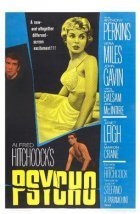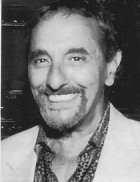
Psycho
- R
- Year:
- 1960
- 109 min
- 862,223 Views
FADE IN:
EXT. PHOENIX, ARIZONA - (DAY) - HELICOPTER SHOT
Above Midtown section of the city. It is early afternoon, a
hot mid-summer day. The city is sun-sunblanched white and
its drifted-up noises are muted in blanched their own echoes.
We fly low, heading in a downtown direction, passing over
traffic-clogged streets, parking lots, white business
buildings, neatly patterned residential districts. As we
approach downtown section, the character of the city begins
to change. It is darker and shabby with age and industry. We
see railroad tracks, smokestacks, wholesale fruit-and-
vegetable markets, old municipal buildings, empty lots.
vegetable The very geography seems to give us a climate of
nefariousness, of back-doorness, dark and shadowy. And secret.
We fly lower and faster now, as if seeking out a specific
location. A skinny, high old hotel comes into view. On its
exposed brick side great painted letters advertise "Transients-
Low Weekly Rates-Radio in Every Room." We pause long enough
to establish the shoddy character of this hotel. Its open,
curtainless windows, its silent resigned look so
characteristic of such hole-and-corner hotels. We move forward
with purposefulness and-toward a certain window. The sash is
raised as high as it can go, but the shade is pulled down to
three or four inches of the inside sill, as if the occupants
of the room within wanted privacy but needed air. We are
close now, so that only the lower half of the window frame
is in shot. No sounds come from within the room.
Suddenly, we tip downward, go to the narrow space between
shade and sill, peep into the room.
A young woman is stretched out on the mussed bed. She wears
a full slip, stockings, no shoes. She lies in and attitude
of physical relaxation, but her face, seen in the dimness of
the room, betrays a certain inner-tension, worrisome
conflicts. She is MARY CRANE, an tension, attractive girl
nearing the end of her twenties and her rope.
A man stands beside the bed, only the lower half of his figure
visible. We hold on this tableau for a long moment, then
start forward. As we pass under the window shade,
CUT TO:
A small room, a slow fan buzzing on a shelf above the narrow
bed. A card of hotel rules is pasted on the mirror above the
bureau. An unopened suitcase and a woman's large, straw open-
top handbag are on the bureau.
On the table beside the bed there are a container of Coco-
Cola and an unwrapped, untouched egg-salad sandwich. There
is no radio.
The man standing by the bed, wearing only trousers, T-shirt
and sox, is SAM LOOMIS, a good-looking, sensual shirt man
with warm humorous eyes and a compelling smile. He is blotting
his neck and face with a thin towel, and is staring down at
Mary, a small sweet smile playing about his mouth. Mary keeps
her face turned away from him.
After a moment, Sam drops the towel, sits on the bed, leans
over and takes Mary into his arms, kisses her long and warmly,
holds her with a firm possessiveness. The kiss is disturbed
and finally interrupted by the buzzing closeness of an
inconsiderate fly. Sam smiles, pulls away enough to allow
Mary to relax again against the pillow. He studies her, frowns
at her unresponsiveness, then speaks in a low, intimate,
playful voice.
SAM:
Never did eat your lunch, did you.
Mary looks at his smile, has to respond, pulls him to her,
kisses him. Then, and without breaking the kiss, she swings
her legs over the side of the bed, toe-searches around, finds
her shoes, slips her feet into searches them. And finally
pulls away and sits up.
MARY:
I better get back to the office.
These extended lunch hours give my
boss excess acid.
She rises, goes to the bureau, takes a pair of small earrings
out of her bag, begins putting them on, not bothering or
perhaps not wanting to look at herself in the mirror. Sam
watches her, concerned but unable to inhibit his cheery,
humorous good mood. Throughout remainder of this scene, they
occupy themselves with dressing, hair-combing, etc.
SAM:
Call your boss and tell him you're
taking the rest of the afternoon
off. It's Friday anyway... and hot.
MARY:
(soft sarcasm)
What do I do with my free afternoon,
walk you to the airport?
SAM:
(meaningfully)
We could laze around here a while
longer.
MARY:
Checking out time is three P.M. Hotels
of this sort aren't interested in
you when you come in, but when your
time's up...
(a small anguish)
Sam, I hate having to be with you in
a place like this.
SAM:
I've heard of married couples who
deliberately spend occasional nights
in cheap hotels. They say it...
MARY:
(interrupting)
When you're married you can do a lot
of things deliberately.
SAM:
You sure talk like a girl who's been
married.
MARY:
Sam!
SAM:
I'm sorry, Mary.
(after a moment)
My old Dad used to say 'when you
can't change a situation, laugh at
it.' Nothing ridicules a thing like
laughing at it.
MARY:
I've lost my girlish laughter.
SAM:
(observing)
The only girlish thing you have lost.
MARY:
(a meaningful quiet,
then, with difficulty:)
Sam. This is the last time.
SAM:
For what?
MARY:
This! Meeting you in secret so we
can be... secretive! You come down
here on business trips and we steal
lunch hours and... I wish you wouldn't
even come.
SAM:
Okay. What do we do instead, write
each other lurid love letters?
MARY:
(about to argue, then
turning away)
I haven't time to argue. I'm a working
girl.
SAM:
And I'm a working man! We're a regular
working-class tragedy!
(he laughs)
MARY:
It is tragic! Or it will be... if we
go on meeting in shabby hotels
whenever you can find a tax-deductible
excuse for flying down deductible
here...
SAM:
(interrupting,
seriously)
You can't laugh at it, huh?
MARY:
Can you?
SAM:
Sure. It's like laughing through a
broken jaw, but...
He breaks off, his cheeriness dissolved, goes to the window,
tries to raise the shade. It sticks. He pulls at it.
It comes down entirely, and the hot sun glares into the room,
revealing it in all its shabbiness and sordidness as if
corroborating Mary's words and attitude. Sam kicks at the
fallen shade, laughs in frustration, grabs on to his humor
again.
SAM:
And besides, when you say I make tax-
deductible excuses you make me out a
criminal.
MARY:
(having to smile)
You couldn't be a criminal if you
committed a major crime.
SAM:
I wish I were. Not an active criminal
but... a nice guy with the conscience
of a criminal.
(goes close to mary,
touches her)
Next best thing to no conscience at
all.
MARY:
(pulling away)
I have to go, Sam.
SAM:
I can come down next week.
MARY:
No.
SAM:
Not even just to see you, to have
lunch... in public?
MARY:
We can see each other, we can even
have dinner... but respectably, in
my house with my mother's picture on
the mantel and my sister helping me
broil a big steak for three!
SAM:
And after the steak... do we send
Sister to the movies and turn Mama's
picture to the wall?
MARY:
Sam! No!
SAM:
(after a pause, simply)
All right.
She stares at him, surprised at his willingness to continue
the affair on her terms, as girls are so often surprised
when they discover men will continue to want them even after
the sexual bait has been pulled in. Sam smiles reassuringly,
places his hands gently on her arms, speaks with gentle and
simple sincerity.
Translation
Translate and read this script in other languages:
Select another language:
- - Select -
- 简体中文 (Chinese - Simplified)
- 繁體中文 (Chinese - Traditional)
- Español (Spanish)
- Esperanto (Esperanto)
- 日本語 (Japanese)
- Português (Portuguese)
- Deutsch (German)
- العربية (Arabic)
- Français (French)
- Русский (Russian)
- ಕನ್ನಡ (Kannada)
- 한국어 (Korean)
- עברית (Hebrew)
- Gaeilge (Irish)
- Українська (Ukrainian)
- اردو (Urdu)
- Magyar (Hungarian)
- मानक हिन्दी (Hindi)
- Indonesia (Indonesian)
- Italiano (Italian)
- தமிழ் (Tamil)
- Türkçe (Turkish)
- తెలుగు (Telugu)
- ภาษาไทย (Thai)
- Tiếng Việt (Vietnamese)
- Čeština (Czech)
- Polski (Polish)
- Bahasa Indonesia (Indonesian)
- Românește (Romanian)
- Nederlands (Dutch)
- Ελληνικά (Greek)
- Latinum (Latin)
- Svenska (Swedish)
- Dansk (Danish)
- Suomi (Finnish)
- فارسی (Persian)
- ייִדיש (Yiddish)
- հայերեն (Armenian)
- Norsk (Norwegian)
- English (English)
Citation
Use the citation below to add this screenplay to your bibliography:
Style:MLAChicagoAPA
"Psycho" Scripts.com. STANDS4 LLC, 2025. Web. 28 Feb. 2025. <https://www.scripts.com/script/psycho_61>.







Discuss this script with the community:
Report Comment
We're doing our best to make sure our content is useful, accurate and safe.
If by any chance you spot an inappropriate comment while navigating through our website please use this form to let us know, and we'll take care of it shortly.
Attachment
You need to be logged in to favorite.
Log In